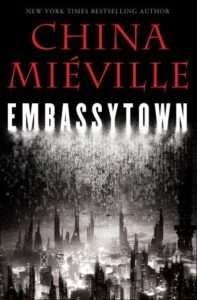 It feels like China Miéville is the mashup king. Whether it’s combining fantasy and steampunk, separate cities in one space, or cloned dyads of humans who speak with one mind as ambassadors to aliens, Miéville combines ideas in ways other authors haven’t. Sometimes, like in Perdido Street Station, it works well. While Embassytown does have this mashup of people and language, it also seems as though Miéville combined two ideas for novels and in the process created a subpar narrative.
It feels like China Miéville is the mashup king. Whether it’s combining fantasy and steampunk, separate cities in one space, or cloned dyads of humans who speak with one mind as ambassadors to aliens, Miéville combines ideas in ways other authors haven’t. Sometimes, like in Perdido Street Station, it works well. While Embassytown does have this mashup of people and language, it also seems as though Miéville combined two ideas for novels and in the process created a subpar narrative.
One part of Embassytown is about the different ways in which species travel from planets. Instead of normal spaceflight, humans have discovered the ability to travel through the immer.
The immer’s reaches don’t correspond at all to the dimensions of the manchmal, this space where we live. The best we can do is say that the immer underlies or overlies, infuses, is a foundation, is langue of which our actuality is a parole, and so on.
It’s like this stormy, weird sea-space where one can get to places faster than in the real world. Imagine if you could enter some other dimension and just walk from Los Angeles to New York in an hour.
This alone is a cool idea and one in which I was more interested. The main character of the book is a young woman named Avice Benner Cho who can immerse in the immer and be a pilot / navigator.
The other section of the book takes place in Embassytown, where Avice is from. She’s returned after “escaping” life on this isolated backwater of a planet, which is home to a species called the Ariekei. The Ariekei have two mouths, grow bio-infused machines, can’t like, and cannot understand language unless it’s spoken in their way, with two mouths and one mental power.
The bulk of the novel delves into the relationships between Embassytowners, the Ariekei, and the empire which technically oversees Embassytown. Language and evolution are at the heart of the triangle as struggles for control between the colony and the empire play out amongst the populace.
The idea that language is truth and Miéville’s exploration of this topic is interesting. But in terms of plot and structure, the novel suffers greatly. At one point, it felt as if Miéville the writer broke the fourth wall and spoke directly to the reader, instead his character Avice. Halfway through the novel, Avice or Miéville says:
I admit defeat. I’ve been trying to present these events with a structure. I simply don’t know how everything happened. Perhaps because I didn’t pay proper attention, perhaps because it wasn’t a narrative, but for whatever reasons, it doesn’t want to be what I want to make it.
Who’s speaking in that paragraph? For me, it’s Miéville conceding the novel’s faults. As a concept, I like Embassytown. As a novel, I found it disappointing.



